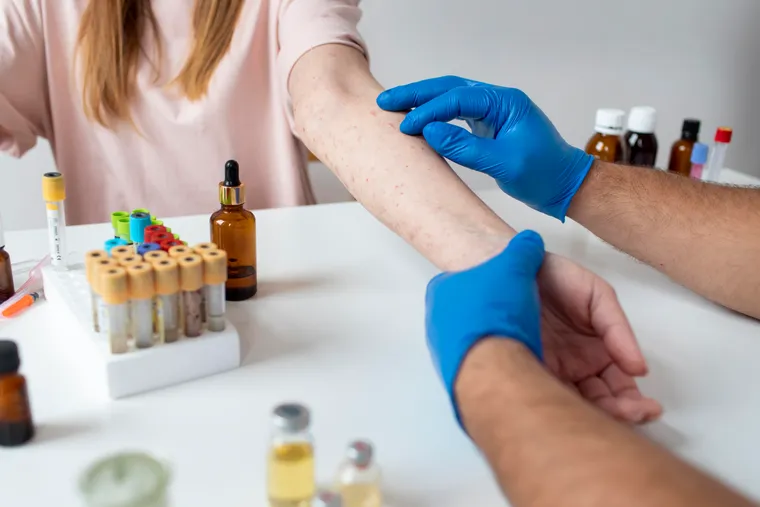This comprehensive guide explores various eczema treatment options, including conventional and alternative methods, to help manage symptoms effectively. Additionally, we discuss different types of eczema and provide valuable advice for individuals seeking effective eczema treatment.
Types of Eczema
Understanding the different types of eczema is crucial for selecting appropriate eczema treatment options:
1. Atopic Dermatitis
- The most common form of eczema, often associated with allergies and asthma.
- Symptoms include dry, itchy, and inflamed skin.
2. Contact Dermatitis
- Occurs when the skin comes into contact with an irritant or allergen.
- Symptoms include redness, itching, and blistering at the contact site.
3. Dyshidrotic Eczema
- Characterized by small, itchy blisters on the hands and feet.
- Often triggered by stress, allergies, or moist environments.
4. Nummular Eczema
- Appears as coin-shaped patches of irritated skin, often on the legs.
- Associated with dry skin and environmental factors.
5. Seborrheic Dermatitis
- Affects areas with a high density of oil glands, such as the scalp and face.
- Symptoms include flaky, greasy patches of skin.
Conventional Eczema Treatment Options
1. Topical Therapies
Topical treatments are the first line of defense in eczema treatment:
- Corticosteroids
- Description: Anti-inflammatory creams or ointments used to reduce inflammation and itching.
- Pros: Effective for managing flare-ups.
- Cons: Prolonged use can cause skin thinning and other side effects.
- Calcineurin Inhibitors
- Description: Non-steroidal creams that suppress the immune response.
- Pros: Suitable for sensitive skin areas, such as the face and eyelids.
- Cons: Potential risk of skin cancer with long-term use.
- Moisturizers
- Description: Emollients that hydrate and protect the skin barrier.
- Pros: Essential for daily skin care, reduces dryness and itching.
- Cons: Frequent application needed to maintain hydration.
2. Systemic Medications
For moderate to severe eczema, systemic medications may be necessary:
- Oral Corticosteroids
- Description: Anti-inflammatory drugs taken orally to reduce severe inflammation.
- Pros: Effective for acute flare-ups.
- Cons: Long-term use can lead to serious side effects, such as osteoporosis and high blood pressure.
- Immunosuppressants
- Description: Medications that suppress the immune system, reducing inflammation.
- Pros: Effective for severe cases unresponsive to other treatments.
- Cons: Increased risk of infections and other side effects.
- Biologics
- Description: Targeted therapies that block specific immune pathways.
- Pros: Effective for severe eczema, fewer side effects compared to traditional immunosuppressants.
- Cons: Expensive, requires regular injections.
Alternative Eczema Treatment Methods
Incorporating alternative methods can complement conventional eczema treatment:
- Natural Oils
- Examples: Coconut oil, sunflower oil, and evening primrose oil.
- Benefits: Moisturize and soothe the skin, reduce inflammation.
- Herbal Remedies
- Examples: Chamomile, calendula, and witch hazel.
- Benefits: Anti-inflammatory and healing properties.
- Probiotics
- Description: Beneficial bacteria that help maintain a healthy immune system.
- Benefits: May reduce the severity of eczema symptoms.
- Acupuncture
- Description: Traditional Chinese medicine technique involving the insertion of needles into specific points on the body.
- Benefits: May help reduce stress and improve skin conditions.
Practical Advice for Managing Eczema
Effective eczema treatment involves a combination of therapies and lifestyle changes:
- Identify Triggers: Keep a diary to track and identify potential triggers, such as allergens, stress, and dietary factors.
- Stay Hydrated: Drink plenty of water and use moisturizers regularly to keep the skin hydrated.
- Avoid Scratching: Use cold compresses or antihistamines to alleviate itching and prevent skin damage from scratching.
- Wear Soft Fabrics: Choose clothing made from soft, breathable fabrics like cotton to reduce skin irritation.
Conclusion
Eczema treatment requires a multi-faceted approach, including topical therapies, systemic medications, alternative methods, and lifestyle changes.

